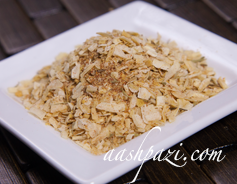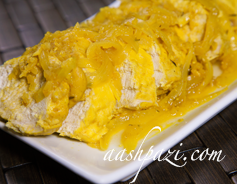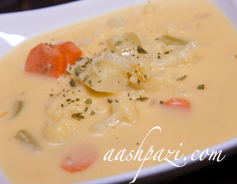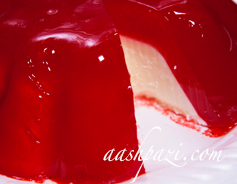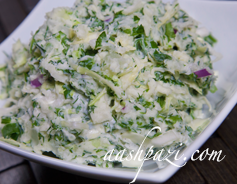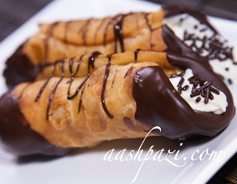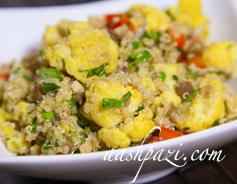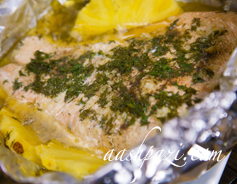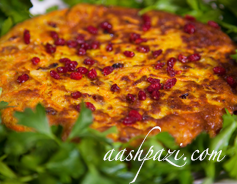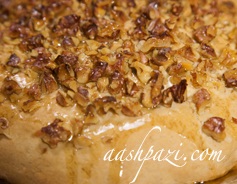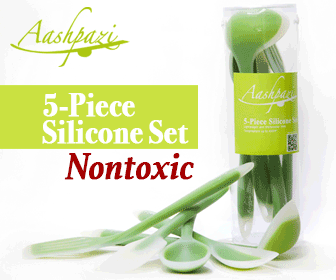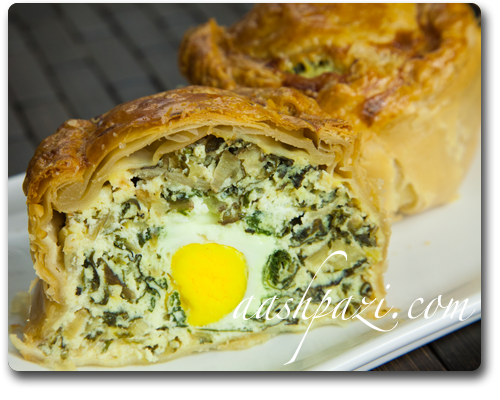
Easter Pie
18 oz (510g) Swiss Chard
1 Cup (3.5 oz / 100g) Parmesan Cheese
15 oz (425g) Part Skim Ricotta Cheese
2 Sheets Puff Pastry
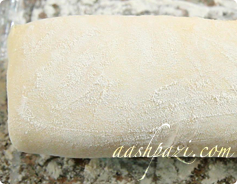 6 Eggs
0.14 oz (4g) Oregano
1 Garlic Clove
Salt & Black Pepper
1/8 Tsp Nutmeg Powder
Preparations:
1- Mince the chard.
Directions:
1- Over medium heat, heat the minced chard for 7 minutes or until tender.
2- Allow the herbs to cool down.
3- Squeeze and drain the water out of the cooked chard and transfer to a large bowl.
4- Stir in fresh oregano and squeeze a fresh garlic on top.
5- Garnish with as much as salt, pepper and nutmeg powder you would like.
6- Stir in 2 eggs, parmesan and ricotta cheese.
7- Lay a puff pastry sheet over (Springform) bakeware of any size you would prefer.
8- Fill 2/3 of the bakeware with the chard filling.
9- Make a (one or few, depending on the size of your bakeware) small hollow into the filling to host the egg.
10- Crack eggs into the hollows with the egg yolk intact.
11- Cover with the more filling and seal with a layer of puff pastry sheet.
12- Brush the pie with egg wash.
13- Make some holes into the top puff pastry sheet for the trapped air to scape during baking.
14- Preheat oven to 350º F (177º C), bake the pies for 50 to 55 minutes or until cooked.
6 Eggs
0.14 oz (4g) Oregano
1 Garlic Clove
Salt & Black Pepper
1/8 Tsp Nutmeg Powder
Preparations:
1- Mince the chard.
Directions:
1- Over medium heat, heat the minced chard for 7 minutes or until tender.
2- Allow the herbs to cool down.
3- Squeeze and drain the water out of the cooked chard and transfer to a large bowl.
4- Stir in fresh oregano and squeeze a fresh garlic on top.
5- Garnish with as much as salt, pepper and nutmeg powder you would like.
6- Stir in 2 eggs, parmesan and ricotta cheese.
7- Lay a puff pastry sheet over (Springform) bakeware of any size you would prefer.
8- Fill 2/3 of the bakeware with the chard filling.
9- Make a (one or few, depending on the size of your bakeware) small hollow into the filling to host the egg.
10- Crack eggs into the hollows with the egg yolk intact.
11- Cover with the more filling and seal with a layer of puff pastry sheet.
12- Brush the pie with egg wash.
13- Make some holes into the top puff pastry sheet for the trapped air to scape during baking.
14- Preheat oven to 350º F (177º C), bake the pies for 50 to 55 minutes or until cooked.
Easter Pie CALORIES & NUTRITION VALUES
Easter Pie is an Italian Pie made during the Easter. It is delicious yet even more nutritious. Easter Pie contains 49 percent vitamin A, 18 percent vitamin C, 17 percent calcium and significant amount of minerals. This easter pie recipe contains high amounts of phosphorus, selenium and vitamin K. Easter pie can be prepared with chard or spinach. Each has countless antioxidants and minerals. Swiss chard contains very high amounts of vitamin K and vitamin A. One serving (3.5 oz / 100g) of Easter Pie has 139 calories (78 calories from fat), 8.7g total fat (4.8g saturated fat), 87mg cholesterol, 290mg sodium, 196mg potassium, 7.4g total carbohydrates (0.9g dietary fiber, 8g sugar), and 9g protein.
nutritional facts
Serving Size 100gAmount Per Serving



